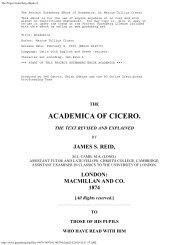From Farm House to the White House - 912 Freedom Library
From Farm House to the White House - 912 Freedom Library
From Farm House to the White House - 912 Freedom Library
Create successful ePaper yourself
Turn your PDF publications into a flip-book with our unique Google optimized e-Paper software.
<strong>Farm</strong> <strong>House</strong> <strong>to</strong> <strong>the</strong> <strong>White</strong> <strong>House</strong>, by William M. Thayer 14<br />
"Understand me," continued Mrs. Washing<strong>to</strong>n, "I am not setting myself up in opposition <strong>to</strong> your plan of<br />
removing. It may prove <strong>the</strong> very best thing for us all. We sha'n't know till we try."<br />
"Well, I think I shall try it," added Mr. Washing<strong>to</strong>n.<br />
And he did try it. He removed <strong>to</strong> <strong>the</strong> aforesaid locality in <strong>the</strong> year 1737. The estate was already his own.<br />
The reader must know from what has been said already, that estates of two, three and five thousand acres, in<br />
Virginia, at that time, were common. Many wealthy English families, fond of rural life, and coveting ample<br />
grounds for hunting and roaming, had settled in <strong>the</strong> "Old Dominion," where land was cheap as well as fertile.<br />
The Washing<strong>to</strong>n family was one of <strong>the</strong>m. <strong>From</strong> <strong>the</strong> day that John Washing<strong>to</strong>n and his bro<strong>the</strong>r settled in<br />
Virginia, <strong>the</strong>y and <strong>the</strong>ir numerous descendants were large landholders. When George was forty-one years of<br />
age, just before <strong>the</strong> stirring scenes of <strong>the</strong> Revolution, we find him writing <strong>to</strong> a Mr. Calvert of George<br />
Washing<strong>to</strong>n Parke Custis:<br />
"Mr. Custis' estate consists of about fifteen thousand acres of land, a good part of it adjoining <strong>the</strong> city of<br />
Williamsburg, and none of it forty miles from that place; several lots in <strong>the</strong> said city; between two and three<br />
hundred negroes, and about eight or ten thousand pounds upon bond, and in <strong>the</strong> hands of his merchants. This<br />
estate he now holds independent of his mo<strong>the</strong>r's dower, which will be an addition <strong>to</strong> it at her death."<br />
Wealthy families at that time lived in expensive style. They kept <strong>the</strong>ir "turn-outs and liveried servants," as we<br />
call <strong>the</strong>m now, and made an imposing appearance on public occasions. The proprie<strong>to</strong>rs were "gentlemen<br />
farmers," whose mansions were conducted on a grand scale of hospitality. Everybody was welcome, even<br />
Indians.<br />
When George's fa<strong>the</strong>r removed <strong>to</strong> <strong>the</strong> banks of <strong>the</strong> Rappahannock, one vast, unbroken forest, on ei<strong>the</strong>r side,<br />
met his view. The woodman's axe had opened only here and <strong>the</strong>re a patch of <strong>the</strong> woods <strong>to</strong> <strong>the</strong> light of <strong>the</strong> sun.<br />
These forests abounded with game, and had long been <strong>the</strong> hunting ground of <strong>the</strong> red men. The river swarmed<br />
with water-fowl of various names and plumage, and often <strong>the</strong> Indian's birch canoe darted over its waters like a<br />
spirit.<br />
The Colony supported a military organization at that time. The Indians were friendly <strong>to</strong> <strong>the</strong> English colonists,<br />
but <strong>the</strong>y might not continue <strong>to</strong> be. England and France were friendly <strong>to</strong> each o<strong>the</strong>r, also, yet both had an eye<br />
upon <strong>the</strong> same possessions in <strong>the</strong> new world. There was no telling how soon a resort <strong>to</strong> arms might be<br />
inevitable. The militia must be maintained against <strong>the</strong> time of need.<br />
George was almost <strong>to</strong>o young <strong>to</strong> appreciate <strong>the</strong> danger when his ears first listened <strong>to</strong> tales of Indian<br />
depredations.<br />
"Several families murdered in cold blood by roving savages," was <strong>the</strong> news Mr. Washing<strong>to</strong>n brought home<br />
one day.<br />
"Where? Where?" Mrs. Washing<strong>to</strong>n inquired, with evident anxiety.<br />
"A long way from here," her husband replied, "but it shows <strong>the</strong> murderous spirit of Indians all <strong>the</strong> same."<br />
"A treacherous race!" remarked Mrs. Washing<strong>to</strong>n.<br />
"Yes; treacherous indeed!" her husband replied, "There is no telling what is in s<strong>to</strong>re for us, in my opinion."<br />
"There is no more reason for <strong>the</strong>ir murdering white men and woman so far away than <strong>the</strong>re is for <strong>the</strong>ir doing it<br />
near by us," suggested Mrs. Washing<strong>to</strong>n.















